I Need Serious Help with this assignment Plenty Points to be
I Need Serious Help with this assignment. Plenty Points to be earned here
Objective: To implement Thread scheduling on the OSP2 simulator using a modified version of the Linux Completely Fair Scheduler strategy. You will implement the module ThreadCB.java to further your understanding of CPU scheduling. Required to turn in: Follow all directions regarding hand-in procedures. Points will be deducted if you do not follow directions precisely. You must submit an electronic copy of your Linux Completely Fair Scheduler solution (or your best try) via dropbox. Late assignments will be assessed a 10% penalty per day. You must document your code and provide a one-page explanation of how you accomplished the assignment (or what you have currently and why you could not complete). You should describe your use, creation, and manipulation of data structures to accomplish the assignment. Building and executing the simulation As in the previous assignment, I suggest that you create a new directory. Copy your files from the previous cpu scheduling project and starting with that version of ThreadCB.java modify it to create the Linux Completely Fair Scheduler solution. The changes you need to make to your code from the previous project are: 1) You will need to add three instance variables and three class variables to the ThreadCB class: Private long lastDispatch; an instance variable that keeps track of when a thread is dispatched. private int lastCpuBurst; an instance variable that you use to update vRunTime. private long vRunTime; an instance variable that keeps track of the virtual run time of each thread, and private static long numThreads; a static class variable that keeps track of how many threads there are. private static ThreadCB[] heap; a static class variable that is used as a heap structure. private static int heapSize; a static class variable that is used keep track of how many threads are in the heap. Be sure to initialize it to 0. 2) Each time you change the status of a thread from ThreadRunning to any other state, you will update its vRunTime value. You will start by determining its current burst time. You calculate the value using the following equation: thread.lastCpuBurst = HClock.get() - thread.lastDispatch; As you can see, you will need the value of lastDispatch in order to do this. Be sure to set this variable each time you dispatch a new thread, i.e., thread.lastDispatch = HClock.get() just before returning from do_dispatch(). Next you update vRunTime using the following expression: thread.vRunTime = ((thread.vRunTime+thread.lastCpuBurst); 3) Instead of using a GenericList readyQueue, you will use a priority queue implemented as a heap. You will code the heap yourself. This is much simpler than the red black tree that Linux actually uses. While you could create a separate heap class, I suggest that you simply declare the heap and the two methods indicated below. My suggestion is that you look at the implementation of the heap from Mark Weiss\' Data Structures and Problem Solving with Java, Addison Wesley for inspiration. http://www.cs.duke.edu/csed/ap/subset/annotated/ap/HeapPriorityQueue.java The declaration of the heap is listed in step 1) on the previous page. The actual initialization of the heap is: heap = new ThreadCB[200]; heapSize = 0; The methods that your will have to code are: private static void insert(ThreadCB t) private static ThreadCB removeTopOfHeap() The method insert() inserts the ThreadCB t into the appropriate position in the heap. The thread with the smallest vRunTime should be at the top of the heap. In other words, your insert method should be comparing the vRunTime values of threads in order to place a newly inserted thread into the appropriate position in the heap. The method removeTopOfHeap() removes and returns the thread at the top of the heap and repairs the heap so that of the remaining threads, the thread with the smallest vRuntTime is at the top of the heap. BE SURE TO REMOVE ALL REFERENCES TO THE GENERICLIST READYQUEUE FROM YOUR CODE SO YOU DON’T GET TRIPPED UP. 4) In do_create(), the newly created thread will be assigned the default vRunTime of 0 and be placed in the heap. In the context of the heap, vRunTime is the value that is used to sort the heap. Don\'t forget to update the value of numThreads. 5) In do_kill(), you will update the value of numThreads. You also make sure that the thread you are killing is no longer in the heap. 6) In do_dispatch() when the current thread is preempted, you need to update it\'s values for lastDispatch and vRunTime and insert it into the heap. 7) In do_dispatch(), you should dispatch the thread with the smallest vRunTime. If the heap is empty, then should you idle the CPU by setting PTBR to null and returning FAILURE. Otherwise, use the heap method removeTopOfHeap() to retrieve the thread with the smallest vRunTime value. The quantum for the thread will be calculated by the following expression: 1000/numThreads; Use this quantum value to set the timer interrupt. Some more hints: The outlined algorithm for the solution to CPU scheduling is derived from a discussion in your OSP2 book regarding the thread scheduling module ThreadCB. Your OSP2 book (and the Silberschatz book) are your best references for conceptual questions on implementation of ThreadCB.java. Be very careful that you do not leave a thread in the ready queue when it is dispatched. If you do, and then re-insert it after a block, the queue may become disconnected, making some ready threads inaccessible. These stranded threads can never be re-scheduled, so threads may starve in the ready queue.
//ThreadCB.java file
package osp.Threads;
import java.util.Vector;
import java.util.Enumeration;
import osp.Utilities.*;
import osp.IFLModules.*;
import osp.Tasks.*;
import osp.EventEngine.*;
import osp.Hardware.*;
import osp.Devices.*;
import osp.Memory.*;
import osp.Resources.*;
public class ThreadCB extends IflThreadCB {
static GenericList readyQ;
public ThreadCB() {
super();
}
public static void init() {
readyQ = new GenericList();
}
/*creates the thread*/
static public ThreadCB do_create(TaskCB task) {
/*Checks to see if the task is null */
if (task == null)
{
ThreadCB.dispatch();
return null;
}
if (task.getThreadCount() >= MaxThreadsPerTask)
{
ThreadCB.dispatch();
return null;
}
/*creates a new thread */
ThreadCB thread = new ThreadCB();
thread.setPriority(task.getPriority());
thread.setStatus(ThreadReady);
thread.setTask(task);
if(task.addThread(thread)==FAILURE)
{
dispatch();
return null;
}
readyQ.append(thread);
dispatch();
return thread;
}
/*destroys a thread*/
public void do_kill() {
TaskCB theTask = null;
if (this.getStatus() == ThreadReady) { /*checks to see if the status of the thread is ready*/
readyQ.remove(this);
this.setStatus(ThreadKill);
}
if (this.getStatus() == ThreadRunning) {
if (MMU.getPTBR().getTask().getCurrentThread() == this) {
MMU.setPTBR(null);
getTask().setCurrentThread(null);
}
}
if (this.getStatus() >= ThreadWaiting) {
this.setStatus(ThreadKill);
}
theTask = this.getTask();
theTask.removeThread(this);
this.setStatus(ThreadKill);
for (int i = 0; i < Device.getTableSize(); i++) {
Device.get(i).cancelPendingIO(this);
}
ResourceCB.giveupResources(this);
if (this.getTask().getThreadCount() == 0) {
this.getTask().kill();
}
dispatch();
}
/*suspends/increments the ThreadWaiting status of a thread*/
public void do_suspend(Event event) {
int status = this.getStatus(); /*Gets the current state of the thread*/
TaskCB task = this.getTask();
if(status==ThreadRunning){
if (MMU.getPTBR().getTask().getCurrentThread() == this) {
this.setStatus(ThreadWaiting);
MMU.setPTBR(null);
this.getTask().setCurrentThread(null);
}
}
else if(status >= ThreadWaiting){
this.setStatus(this.getStatus()+1);
}
if(!event.contains(this)) {
event.addThread(this);
}
ThreadCB.dispatch();
}
/*resumes/decrements the ThreadWaiting status of a thread*/
public void do_resume()
{
if(getStatus() < ThreadWaiting) {
MyOut.print(this, \"Attempt to resume \" + this + \", which wasn\'t waiting\");
return;
}
MyOut.print(this, \"Resuming \" + this);
if(this.getStatus() == ThreadWaiting) {
setStatus(ThreadReady);
} else if (this.getStatus() > ThreadWaiting) {
setStatus(getStatus()-1);
}
if (getStatus() == ThreadReady) {
readyQ.append(this);
}
dispatch();
}
/*Selects a thread to dispatch*/
public static int do_dispatch() {
ThreadCB thread = null;
ThreadCB newThread = null;
try {
thread = MMU.getPTBR().getTask().getCurrentThread(); /*Get current task and thread*/
}
catch (NullPointerException e){
}
if (thread != null) {
thread.getTask().setCurrentThread(null);
MMU.setPTBR(null);
thread.setStatus(ThreadReady);
readyQ.append(thread);
}
if (readyQ.isEmpty()) { /*if the the ready queue is empty, then it will return a failure*/
MMU.setPTBR(null);
return FAILURE;
}
else {
newThread = (ThreadCB)readyQ.removeHead();
MMU.setPTBR(newThread.getTask().getPageTable());
newThread.getTask().setCurrentThread(newThread);
newThread.setStatus(ThreadRunning);
}
return SUCCESS;
}
public static void atError() {
}
public static void atWarning() {
}
}
Solution
package osp.Threads;
import java.util.Vector;
import java.util.Enumeration;
import osp.Utilities.*;
import osp.IFLModules.*;
import osp.Tasks.*;
import osp.EventEngine.*;
import osp.Hardware.*;
import osp.Devices.*;
import osp.Memory.*;
import osp.Resources.*;
public class ThreadCB extends IflThreadCB {
static GenericList readyQ;
public ThreadCB() {
super();
}
public static void init() {
readyQ = new GenericList();
}
/*creates the thread*/
static public ThreadCB do_create(TaskCB task) {
/*Checks to see if the task is null */
if (task == null)
{
ThreadCB.dispatch();
return null;
}
if (task.getThreadCount() >= MaxThreadsPerTask)
{
ThreadCB.dispatch();
return null;
}
/*creates a new thread */
ThreadCB thread = new ThreadCB();
thread.setPriority(task.getPriority());
thread.setStatus(ThreadReady);
thread.setTask(task);
if(task.addThread(thread)==FAILURE)
{
dispatch();
return null;
}
readyQ.append(thread);
dispatch();
return thread;
}
/*destroys a thread*/
public void do_kill() {
TaskCB theTask = null;
if (this.getStatus() == ThreadReady) { /*checks to see if the status of the thread is ready*/
readyQ.remove(this);
this.setStatus(ThreadKill);
}
if (this.getStatus() == ThreadRunning) {
if (MMU.getPTBR().getTask().getCurrentThread() == this) {
MMU.setPTBR(null);
getTask().setCurrentThread(null);
}
}
if (this.getStatus() >= ThreadWaiting) {
this.setStatus(ThreadKill);
}
theTask = this.getTask();
theTask.removeThread(this);
this.setStatus(ThreadKill);
for (int i = 0; i < Device.getTableSize(); i++) {
Device.get(i).cancelPendingIO(this);
}
ResourceCB.giveupResources(this);
if (this.getTask().getThreadCount() == 0) {
this.getTask().kill();
}
dispatch();
}
/*suspends/increments the ThreadWaiting status of a thread*/
public void do_suspend(Event event) {
int status = this.getStatus(); /*Gets the current state of the thread*/
TaskCB task = this.getTask();
if(status==ThreadRunning){
if (MMU.getPTBR().getTask().getCurrentThread() == this) {
this.setStatus(ThreadWaiting);
MMU.setPTBR(null);
this.getTask().setCurrentThread(null);
}
}
else if(status >= ThreadWaiting){
this.setStatus(this.getStatus()+1);
}
if(!event.contains(this)) {
event.addThread(this);
}
ThreadCB.dispatch();
}
/*resumes/decrements the ThreadWaiting status of a thread*/
public void do_resume()
{
if(getStatus() < ThreadWaiting) {
MyOut.print(this, \"Attempt to resume \" + this + \", which wasn\'t waiting\");
return;
}
MyOut.print(this, \"Resuming \" + this);
if(this.getStatus() == ThreadWaiting) {
setStatus(ThreadReady);
} else if (this.getStatus() > ThreadWaiting) {
setStatus(getStatus()-1);
}
if (getStatus() == ThreadReady) {
readyQ.append(this);
}
dispatch();
}
/*Selects a thread to dispatch*/
public static int do_dispatch() {
ThreadCB thread = null;
ThreadCB newThread = null;
try {
thread = MMU.getPTBR().getTask().getCurrentThread(); /*Get current task and thread*/
}
catch (NullPointerException e){
}
if (thread != null) {
thread.getTask().setCurrentThread(null);
MMU.setPTBR(null);
thread.setStatus(ThreadReady);
readyQ.append(thread);
}
if (readyQ.isEmpty()) { /*if the the ready queue is empty, then it will return a failure*/
MMU.setPTBR(null);
return FAILURE;
}
else {
newThread = (ThreadCB)readyQ.removeHead();
MMU.setPTBR(newThread.getTask().getPageTable());
newThread.getTask().setCurrentThread(newThread);
newThread.setStatus(ThreadRunning);
}
return SUCCESS;
}
public static void atError() {
}
public static void atWarning() {
}
}
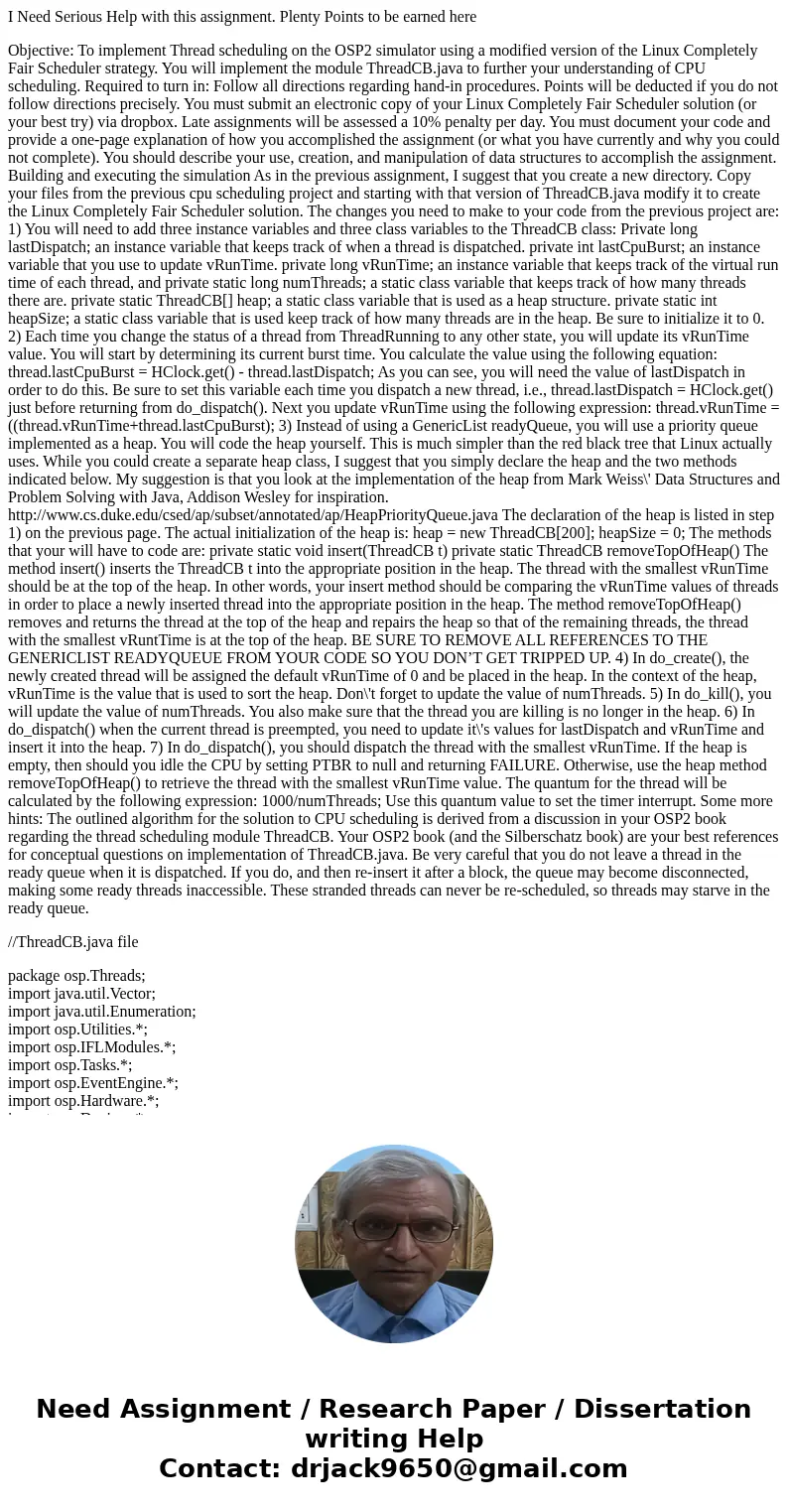
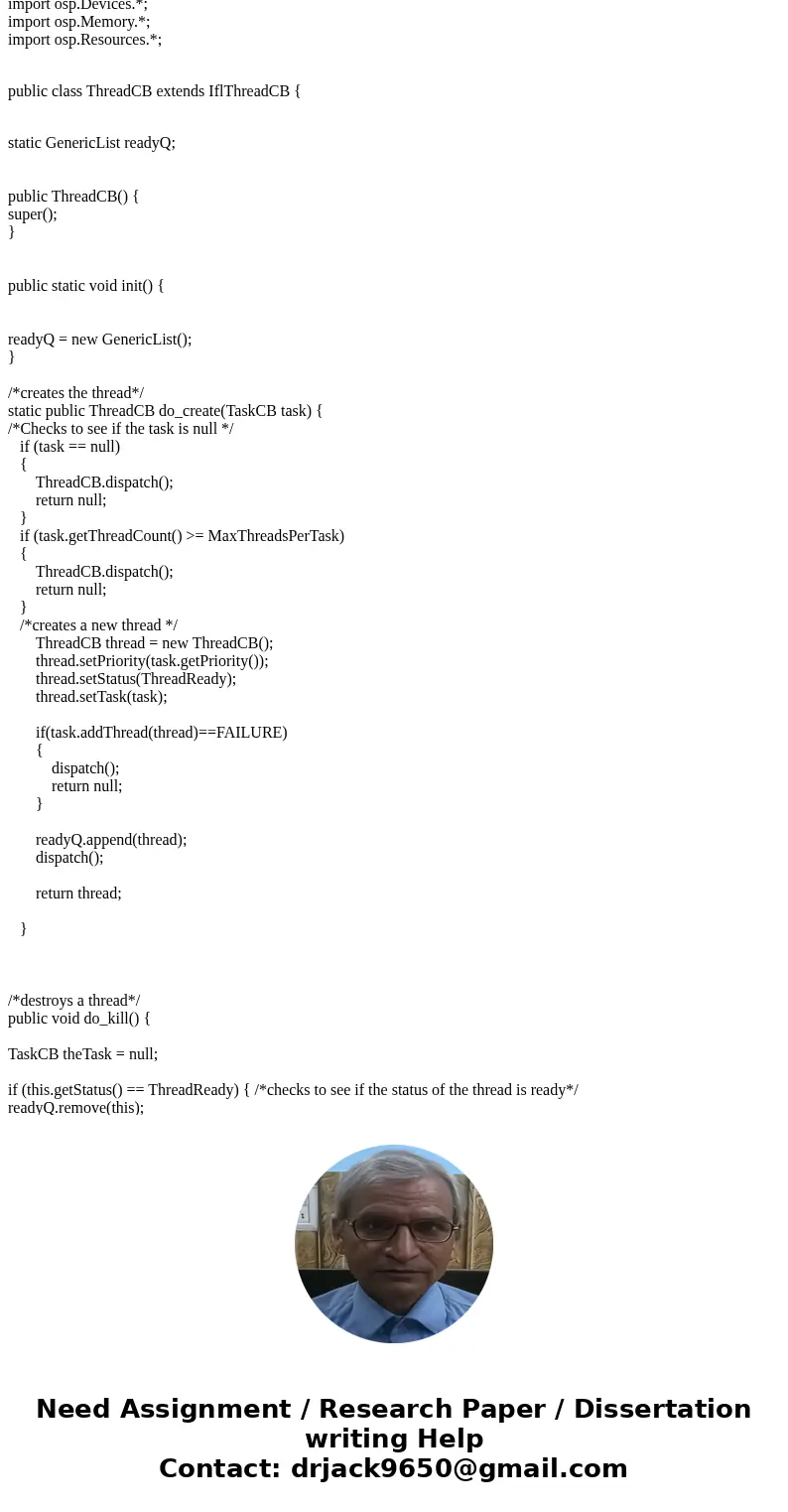
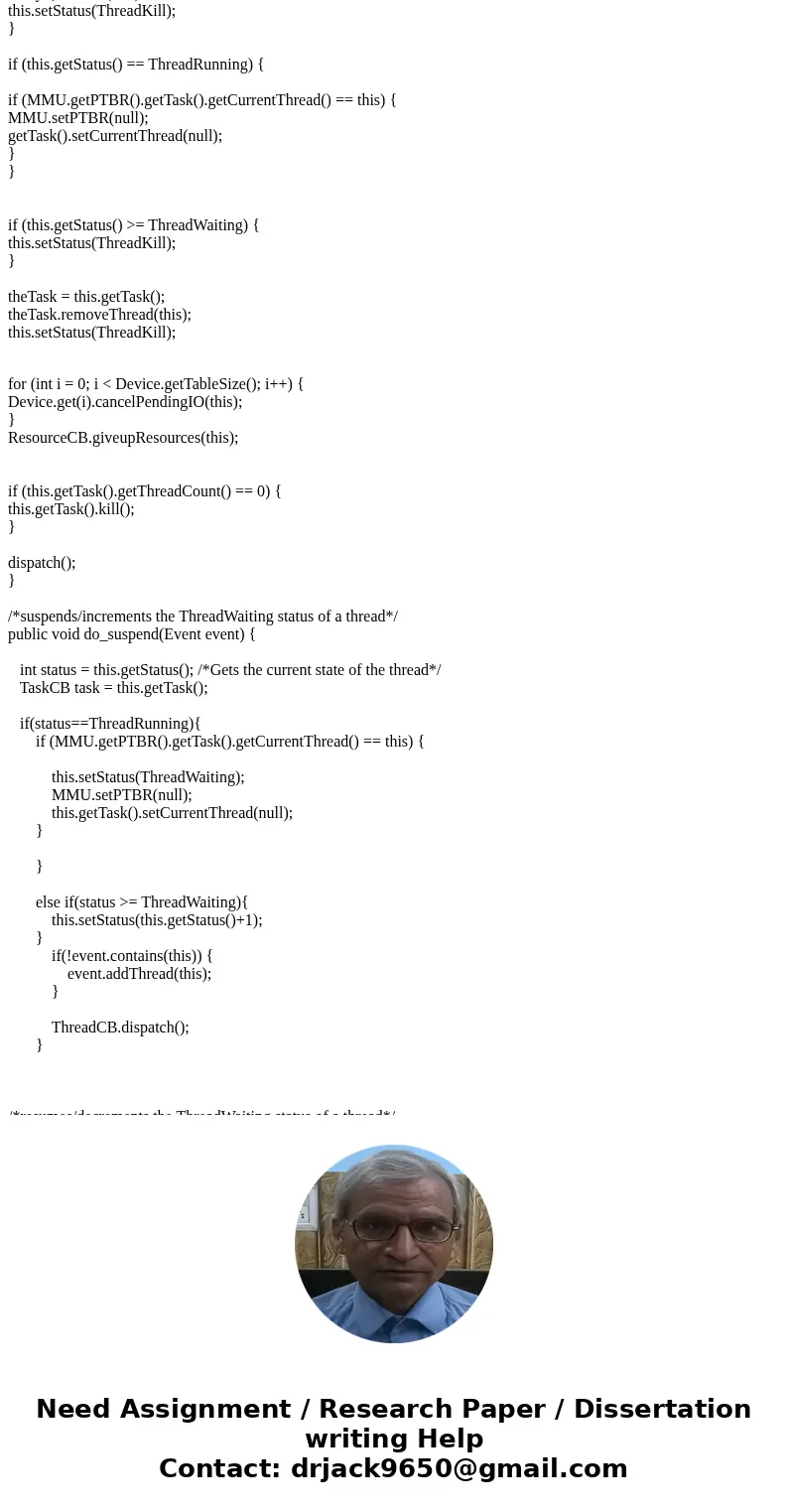
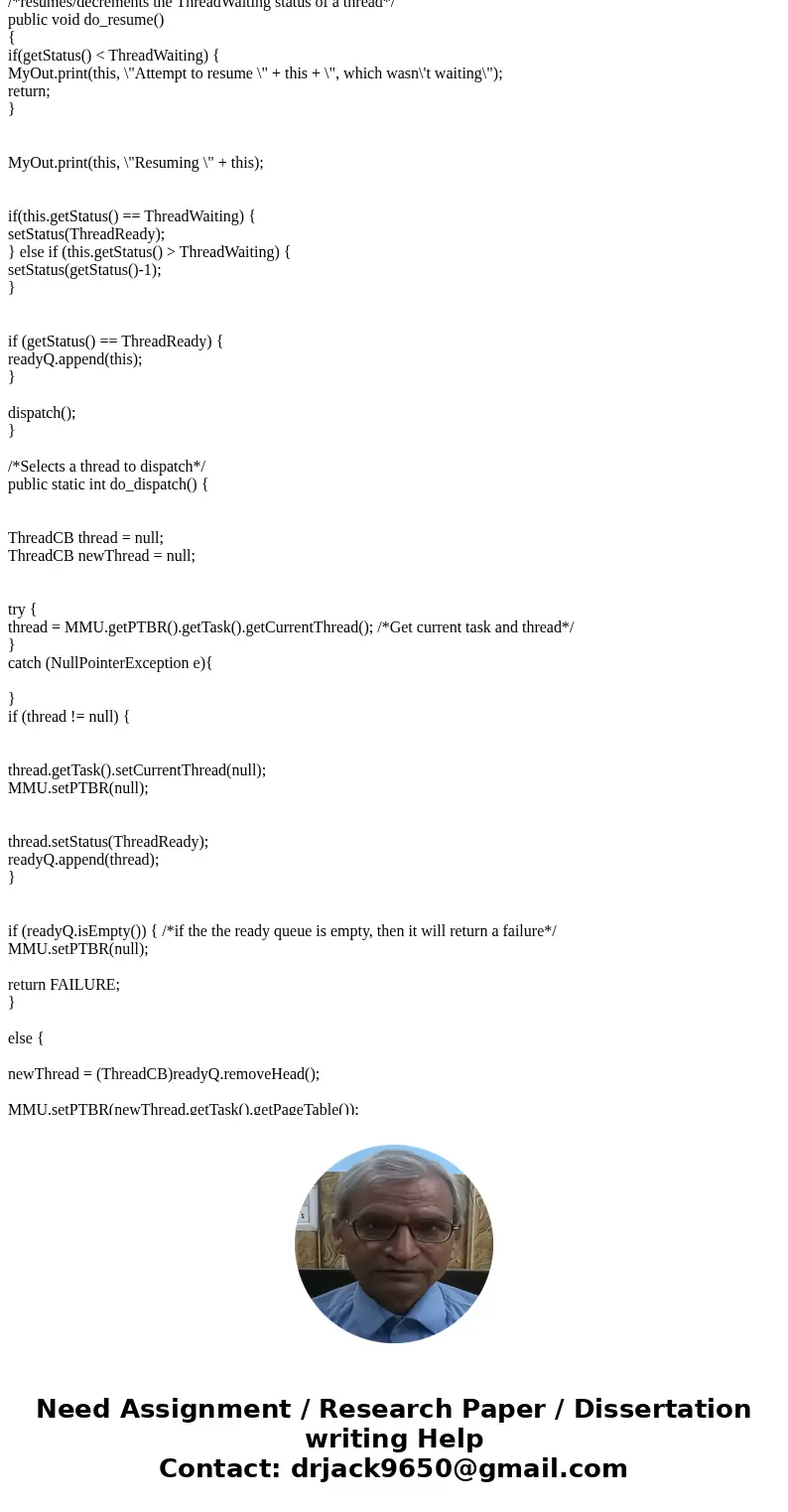
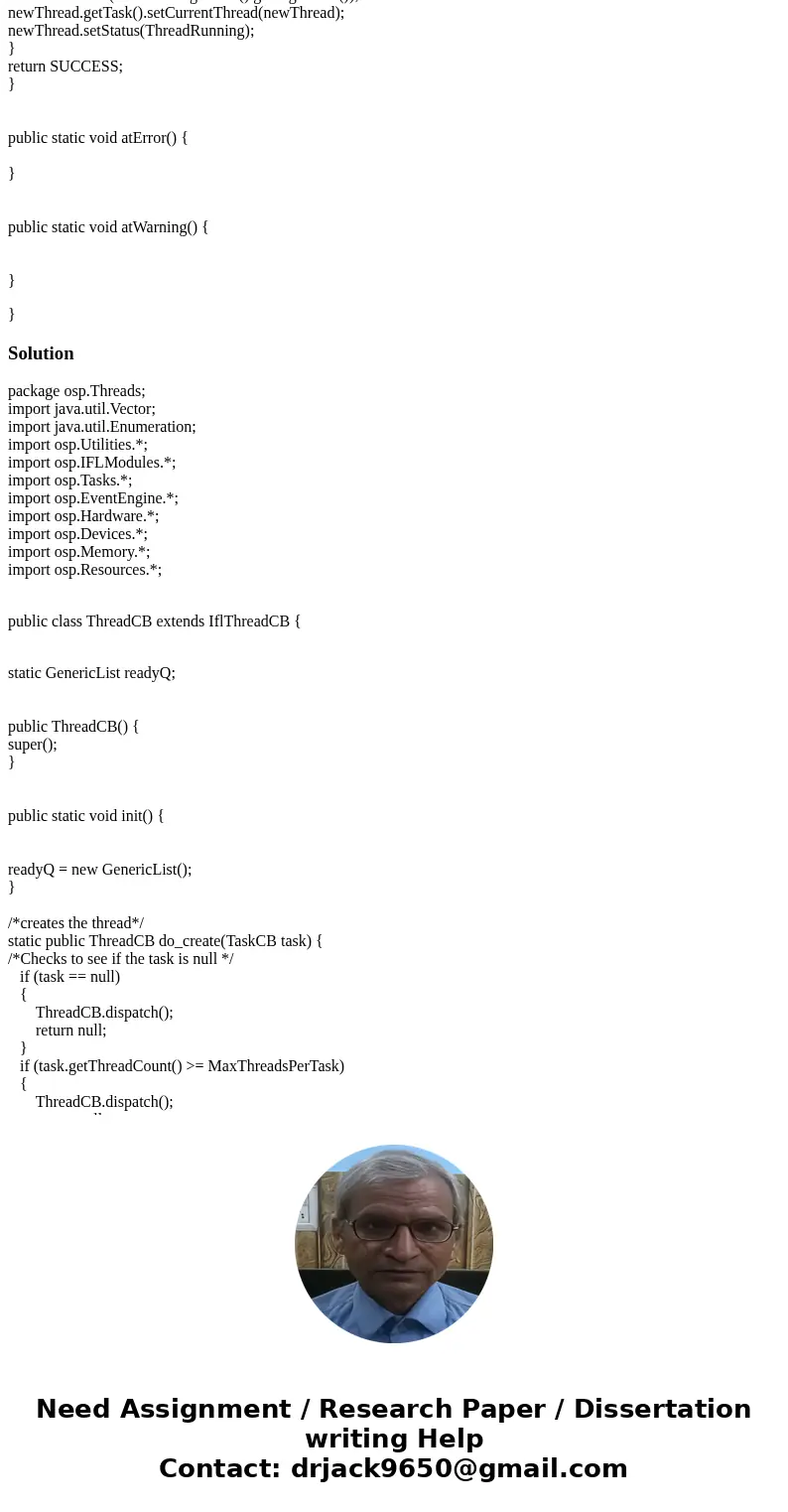
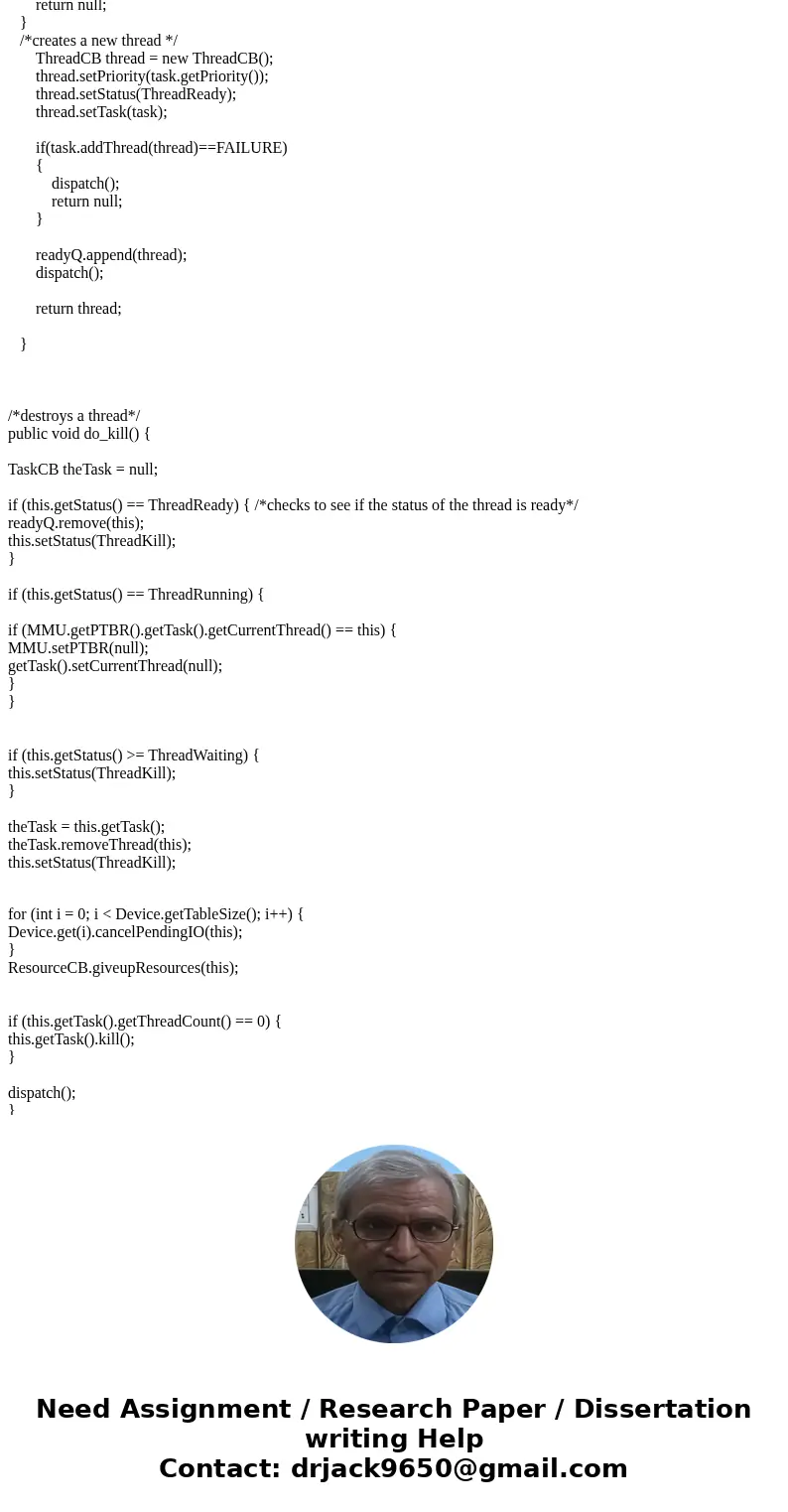
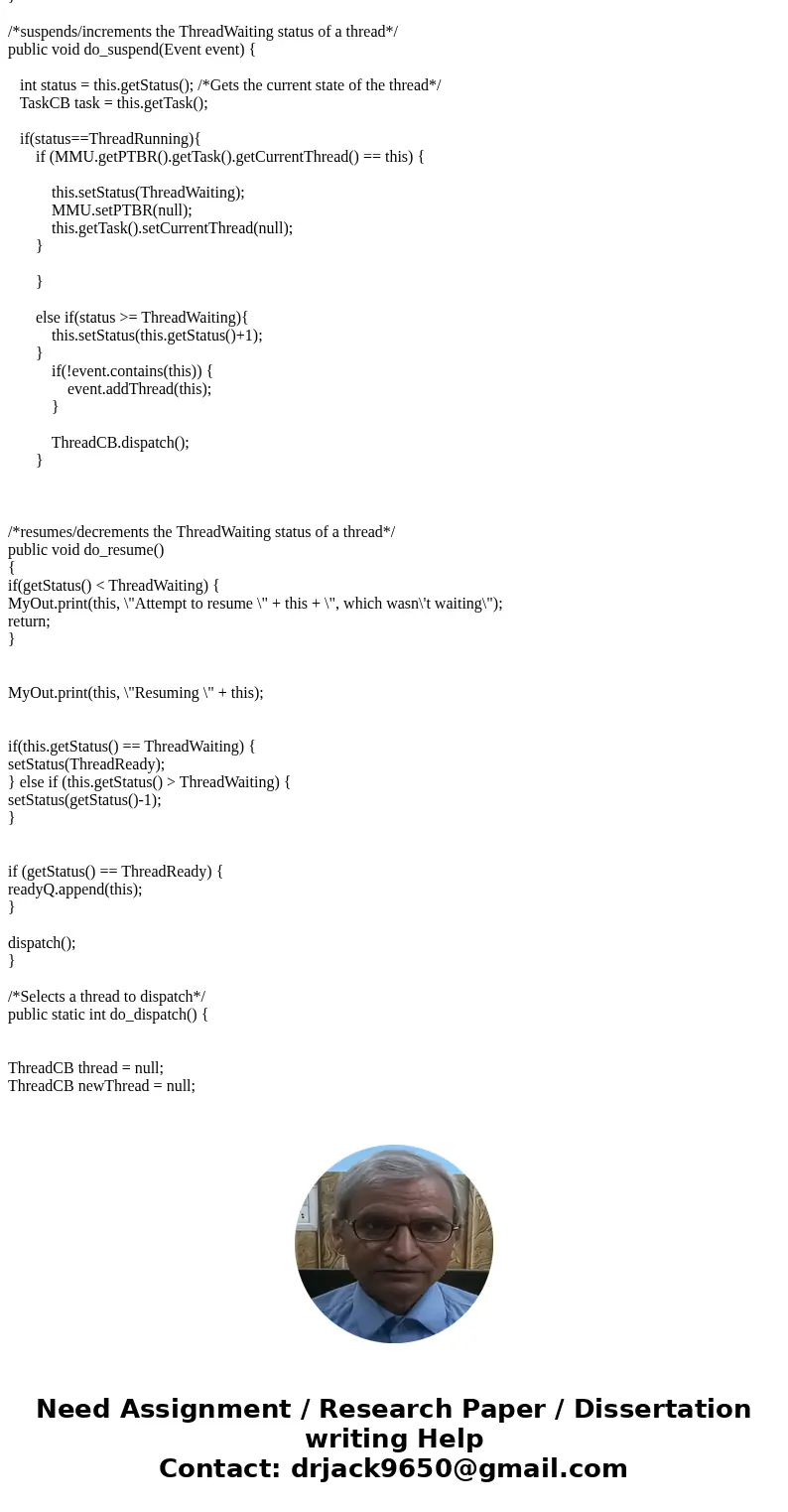
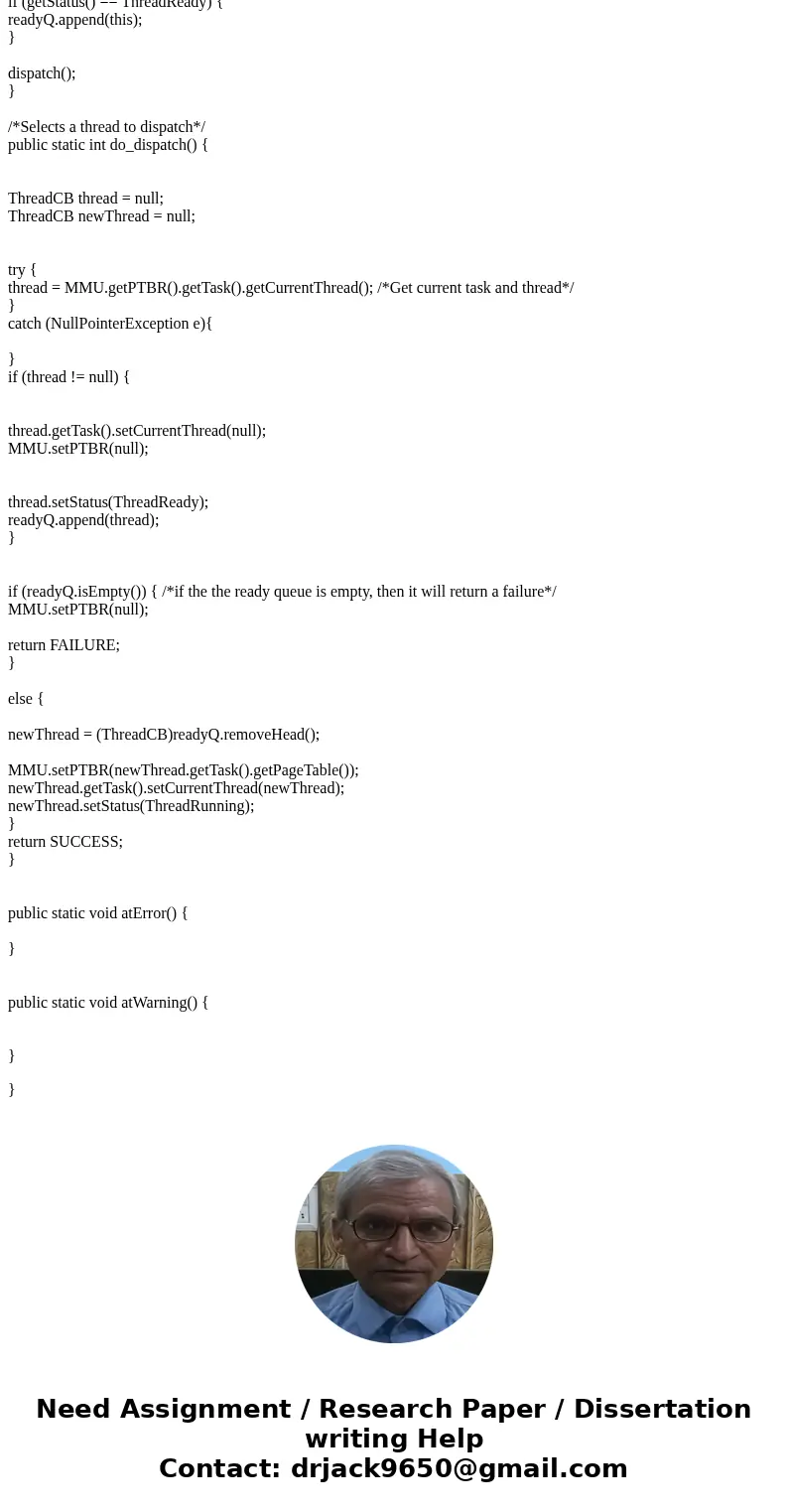
 Homework Sourse
Homework Sourse